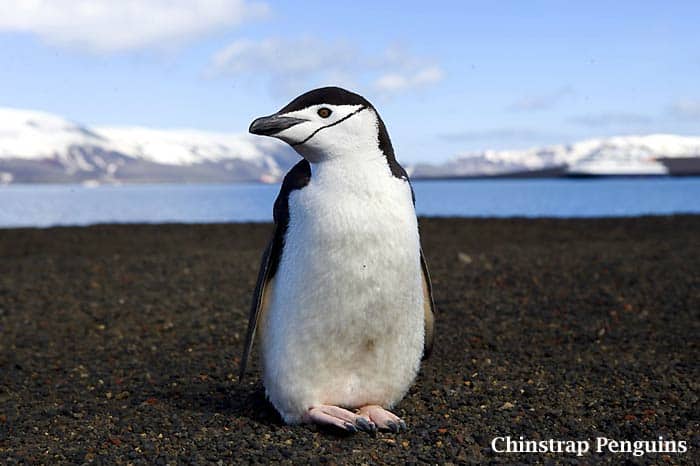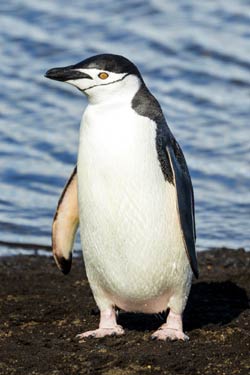
Endemic to the rocky islands in Antarctica, the Chinstrap penguin is considered as one of the world’s smallest and most easily identifiable penguin species. As these penguins have a narrow black band under their head resembling the black helmet-wearing, they are called Chinstrap penguins.
The Chinstrap penguin is also called as the Ringed penguin or Bearded penguin for the same reason.
In this page, we’ll explore Chinstrap penguin facts, the IUCN status, its anatomy, diet, predators, life-span (in captivity and wild), how they sound & more.
Table of Contents
Biological Classification
| Kingdom | Order | Family | Genus | Species |
|---|---|---|---|---|
| Animalia | Sphenisciformes | Spheniscidae | Pygoscelis | Pygoscelis antarcticus |
![]()
Chinstrap Penguin Habitat
![]()
 Chinstrap penguins live in Antarctica, South American countries such as Argentina, Bouvet Island, and Chile.
Chinstrap penguins live in Antarctica, South American countries such as Argentina, Bouvet Island, and Chile.
Also, the Islands near the Antartica continent namely the Falkland Islands, the South Orkney Islands, the South Sandwich Islands, Balleny Islands, and the Heart Island & McDonald Islands have Chinstrap penguins in large numbers.
They also found in New Zealand, the islands of Saint Helena and Tristan da Cunha, and South Africa. October and November are their best breeding period in a year.
![]()
Chinstrap Penguin Anatomy
![]()

- The maximum height that Chinstrap penguin can grow into is 72 cm.
- A fully developed adult Chinstrap penguin weighs about 3 to 5 kg.
- This species of penguin exhibits the sexual dimorphism like African penguins.
- The white belly of Chinstrap penguins acts as a camouflage similar to Adelie penguins against the predators such as seals.
- Underneath the feather coat, they have a firm layer of blubber (or fat) which helps in the extreme cold conditions to not to lose its body heat when swimming against the icy-waters. These evolutionary adaptations help them to survive in the Antartic regions.
![]()
Chinstrap Penguin Diet
![]()
Chinstrap penguins prey on krill, shrimp, lanternfish, and squids. They swim as far as 50 miles from the shoreline into the ocean to catch them even on the freezing waters as they have well-built tightly packed feathers (waterproof).
![]()
Chinstrap Penguin Predators
![]()
The main predator on the sea is Leopard seal. The ocean birds such as sheathbill and brown skua steal and eat their eggs and unattended or orphan chicks.
![]()
Chinstrap Penguin Sound Call
![]()
Chinstrap penguins also called as stone-cracker penguin for their weird sound call (listen below).
![]()
Chinstrap Penguin Documentary
![]()
![]()
Chinstrap Penguin Lifespan
![]()
In the wild, Chinstrap penguins live from 12 to 20 years. In captivity, they can live up to 20 to 22 years.
![]()
Chinstrap Penguin Facts
![]()
- Chinstrap penguins can hold their breath underwater for 20 to 30 seconds.
- Chinstrap penguins are very social animals.
- In 2004, in Central Park Zoo, New York City, two male Chinstrap penguins (named Roy & Silo) started to hatch a rock. Then zookeeper replaced the stone with a real fertile egg. Both successfully hatched that egg and raised a chick.
- They always lay two eggs with 33 to 37 incubation period.
![]()











